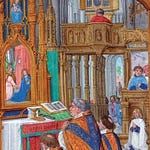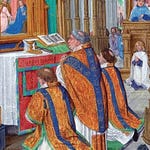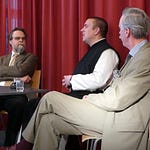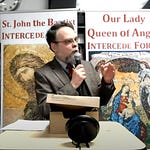Why does Sacred Scripture end with the Book of Revelation? The reason is as simple as it is profound: Revelation is not merely or even primarily the closure of a written book but the beginning of, or opening to, something else intrinsically greater than Scripture: the living worship of the living Body of Christ. The essential vocation of the Church is the glorification of God and the sanctification of souls in time of tribulation. Moreover, the fundamental symbolic paradigm of worship according to Sacred Scripture and the entire Christian tradition is that God is our great King, ruling over all with the sceptre of righteousness; that Jesus Christ is the King of kings and Lord of lords, the Judge of the living and the dead; that heaven is His throne and earth His footstool; and that, in His holy court, a vast multitude of angels minister unto Him. This royal, monarchical, courtly imagery — so prominent in traditional rites such as the Tridentine Mass and the Divine Liturgy of St. John Chrysostom — is no mere time-bound cultural construct, ready to be replaced with a more democratic or populist convention in our times. The attempt to do so in the Novus Ordo distorted the content and manner of worship in accord with Revelation.
Tradition and Sanity
The best in Catholic culture, the Latin Mass, Sacred Music, theology, and more, brought to you from Tradition and Sanity Substack by Peter and Julian Kwasniewski. Visit traditionsanity.substack.com!
The best in Catholic culture, the Latin Mass, Sacred Music, theology, and more, brought to you from Tradition and Sanity Substack by Peter and Julian Kwasniewski. Visit traditionsanity.substack.com!Listen on
Substack App
Spotify
YouTube
Pocket Casts
RSS Feed
Recent Episodes














Share this post